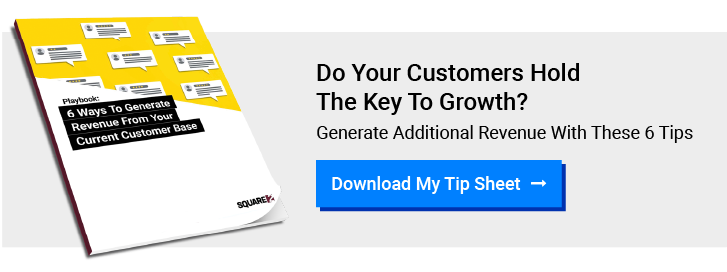
Here Are the Reasons Why Most Businesses Don’t Hit Their Revenue Goals
It’s a different kind of epidemic. Companies are firing chief marketing officers (CMOs) and agencies left and right. Why can’t anyone get results? Is everyone inept? Are they using the wrong tools? Are the campaign designs flawed? What’s going on and what can you do about it?
HubSpot reports only 23% of companies hit their revenue goals month over month. Salesforce reports it at 46%. My nonscientific research shows it at closer to 10%. But there is no arguing this fact: Companies are struggling to hit their revenue goals month in and month out.
With over 18 years of experience and research to back up our findings, we’re going to attempt to uncover the reasons why this is such a hard part of getting the great game of business right.
Before we narrow it down to the most common reason, I think it’s worth looking at all of the reasons. After all, this is a highly complex challenge. Getting anyone to buy anything requires a highly complicated multi-touch set of executables. It’s even harder today when prospects are inundated with information from a variety of channels.
Last I looked, the average American consumer is exposed to over 3,000 messages a day. How could anyone possibly cut through that clutter? Great companies find a way. The companies with great stories. The companies with great products and services that people talk about. The companies that zig when everyone else zags.
Why don’t more people do it right? Here are 10 reasons we see in our work with actual businesses. These ALL contribute to program failure, disappointing results and lack of revenue growth.
If you see your company in these reasons, it’s not surprising, but you should start thinking about how to solve these challenges if you want to grow.
Reason 10
Companies have unrealistic expectations about what’s possible and the time frame.
This is common. Companies that have no marketing, no leads and no pipeline today want all those zeros to be erased in weeks. They expect leads in weeks instead of months. They expect sales in months instead of years, even if their sales cycle is six months.
Other companies have some marketing going now but admit they don’t know what they’re doing or how to make it better. Still, they expect someone to fix it instantly and immediately provide a lift to the entire organization.
Building a revenue generation machine takes time. There are going to be wins and losses. There are going to be mistakes. There are going to be down months. You have to consider this a marathon, not a sprint. And the person who wins the marathon is the one who doesn’t quit when it gets tough.
Reason 9
Companies underinvest in marketing, sales and customer service.
People tell us they’ve budgeted $5,000 a month for all their marketing requirements, yet they expect to go from 20 leads a month to 200 leads a month in just two months. That’s not happening.
In this article, we discuss the direct connection between expectations, speed and investment. You have to know exactly how much money you need to improve your marketing by exactly what levels. You have to invest in campaigns, in technology, in expertise and in asset creation.
These are long-term investments that will pay off over time. The bigger your goals and the faster your timeline, the more you should plan on investing. Instead of telling your agency that you don’t know your budget, come to them with a healthy number. Ask whether that number allows them to produce the results you need, and then work with them to refine that number based on their experience.
Programs that are underfunded never produce results in the time frames expected.
Reason 8
Companies skip or shortcut the strategy work necessary to create scalable revenue growth.
We’ve coined the phrase “random acts of marketing.” This is what you do when you don’t have a strategy or a plan. You try different tactics hoping something works. That is not going to work.
You must go through very specific strategy development steps. You wouldn’t bake a cake without a recipe. You wouldn’t build a home without architectural drawings. You can’t build a revenue generation machine without a strategic plan.
Yet time and time again business leaders tell us they don’t need strategy, don’t want to pay for it and don’t think it’s worth their time or money. This is a major mistake.
You have to know who you want to attract and who you want to target. You have to know them intimately.
You have to know their buyer journey and then map the marketing, sales and service experience to that journey. You need to have a remarkable story that everyone can tell in 10 seconds.
You also have to know exactly which tactics you plan on executing when, along with the expected results from each executable.
Finally, you need an ongoing improvement engine to review data, uncover insights and use those insights to inform your action plans. Without even one of these, your entire plan collapses on itself, just like your house would collapse if you tried to build it without plans.
Reason 7
Companies don’t have the expertise to build a revenue generation machine.
What we’re proposing and what people ask us to do for them is highly complex and requires a great deal of expertise. Most companies don’t have this expertise. Most agencies don’t have this expertise. Even if you hire someone who has done something similar once or twice, that’s only one or two experiences.
To do this well you need many more experiences. Would you hire a doctor for your life-saving surgery if she only operated one or two times before? Of course not. You want a doctor who’s done the operation successfully hundreds of times.
The same is true here. You need people who have done this many times. They’ve seen the traps, managed the detours and recovered from the mistakes. You want to pay up for experience.
Reason 6
Companies hire the cheap agency to help them, and the agency doesn’t have the expertise to build a revenue generation machine.
Do you want the agency that has done this 10 times or 100 times? Do you want the cheapest agency? Would you want the cheapest doctor? Of course not.
Do you want the agency that lacks process, systems and methodology to walk you through? Or do you want the agency that brings a system for building your revenue generation machine?
Do you want the agency that gives you a junior account manager or the agency that puts a team of senior people on your project? Is the cost even relevant if you get your revenue generation machine?
Does it make sense to hold every agency accountable for the mistake a few agencies have made over the years? So you hired the wrong agency three years ago – that doesn’t mean this new agency is going to be anything like that.
Reason 5
Companies ignore their customers and the revenue hidden in favor of simply getting more new customers.
Revenue almost always means new customers to most people, but that’s a mistake. One of the easiest places to generate revenue is from the people who already know, like and trust you – your current customers.
Reaching out to customers, designing ongoing communication to customers, telling new stories to customers and building your customers into advocates so they tell everyone about you is vitally important to your revenue growth initiatives.
The better you take care of customers, the more likely they become advocates. The more they talk, the more they advocate, the more they review and the more they share with friends, the faster your revenue grows. It’s the accelerant most companies miss.
Reason 4
Companies don’t align sales and marketing effectively or in a professional way.
It might sound wild, but it’s true. Most companies have not aligned sales and marketing. Marketing generates leads and sales closes the leads. Marketing hates sales because they complain about lead quality (and it’s usually an accurate criticism). Sales hates marketing because they give them bad leads.
This underlying conflict prevents marketing and sales from working together to create a remarkable experience for prospects from the first time they click up to and through when they close.
This means conversion rates are low, close rates are low, sales cycles are longer than necessary and salespeople are generally lacking the right tools to work more efficiently.
There are more chief revenue officers (CROs) today than in previous years, but some of those CROs are simply managing two separate teams. It’s not until they come together as a revenue team with similar goals and a consolidated mandate to create a remarkable experience for prospects that companies truly see major improvements in revenue growth.
Reason 3
Companies don’t work to fix their horrible sales process, sales team and sales execution.
Want to grow? Hire two more sales reps and let them do what all the other inefficient sales reps are doing. This is what most companies do when they want to grow.
Instead of installing a better process and achieving more revenue with the same number of reps, or doing the same revenue with fewer reps and dramatically reducing your cost of acquisition, most companies run this old-school playbook that gives sales a pass.
If your company has a poor sales process and your competitors have a new guided 2021 sales process, you’re going to lose every time. Ask a few new customers why they chose you and their answer will be, “Your sales team was better,” or, “Your sales process made us feel more comfortable.”
Ask a few prospects you didn’t close why you lost the deal, and they’ll likely say, “Your competitor made us feel more comfortable during the sales process.” Hands down, it’s the answer 80% of the time.
Your sales process, the people who work in sales, your approach to sales, your sales tools, your sales technology (CRM) and your sales data all need to be upgraded to 2021 standards.
Reason 2
Companies say they’re playing the long game but only want short-term results and ROI.
This is a big one. Most CEOs talk a good game about being patient, understanding marketing and playing the long game, but if they get challenged on ROI at one board meeting, they’ll crumble like a day-old cookie that was left sitting out.
They can’t explain why it takes time. They don’t understand the connection between their brand and lead generation. They don’t understand high-quality leads that contribute to pipeline and close quickly vs. marketing-qualified leads (MQLs) that waste sales reps’ time and never convert into business.
They haven’t taken the time to understand the massive amount of work needed to create campaigns that leverage multiple channels and include high levels of personalization. They don’t understand how paid search and paid social are NOT spigots that get turned on and turned off. They don’t understand the challenge of creating the massive amount of content at scale required to drive brand awareness, demand generation and high-quality sales opportunities.
All of this takes time, investment, commitment and patience. It also takes expertise and methodology. Most companies don’t understand this, so they fire their CMO or digital agency right as the program is reaching maturity. Then they end up starting all over again. In some cases, they never get it right.
Reason 1
Companies don’t do the hard work to create a remarkable product, service or experience.
Finally, we get to the number one reason companies can’t create truly scalable, repeatable and predictable revenue generation machines.
It’s because their product or service isn’t really that great, and it’s definitely not remarkable, even though with some work and vision it could be remarkable.
If you sell project management software to general managers at construction companies and there are three other similar products from similar companies, why should those GMs pick your product? They’re going to pick the cheapest option since they’re all the same.
No matter how hard we work on marketing, sales and customer service, if there is no difference, cost makes up people’s mind. If you’re not the cheapest, you’ll never grow. If you are the cheapest, you’ll never grow profitably.
What if your product was the only one to work on a smartphone? What if your product could be installed in 10 minutes? What if your product came with a live person to answer construction-related questions? What if your product automatically connected with all of the company’s other technologies in seconds after installation? What if your product was so easy to use that no training was required?
The answer is simple – your software company would explode. Everyone would buy it. Your marketing would be simple and your sales even easier.
But all of those special features that made this example remarkable are hard to develop. So most companies pass on that hard work and lean on marketing and/or sales to grow. That’s an almost impossible task with an unremarkable product or service.
This is why we spend so much time with clients on the strategy part of our work with them. We want them to understand how important being remarkable is to growth. The rest of the work gets easier when you are truly remarkable. Not being remarkable is the most common reason companies can’t sustain any month-over-month growth.
I hope this was helpful.

CEO and Chief Revenue Scientist
Mike Lieberman, CEO and Chief Revenue Scientist
Eliminate Hit-or-Miss Marketing Moves
Get advice, tips, tools and guidance to generate more leads for your company in this weekly email newsletter.



Eliminate Hit-or-Miss Marketing Moves
Get advice, tips, tools and guidance to generate more leads for your company in this weekly email newsletter.














